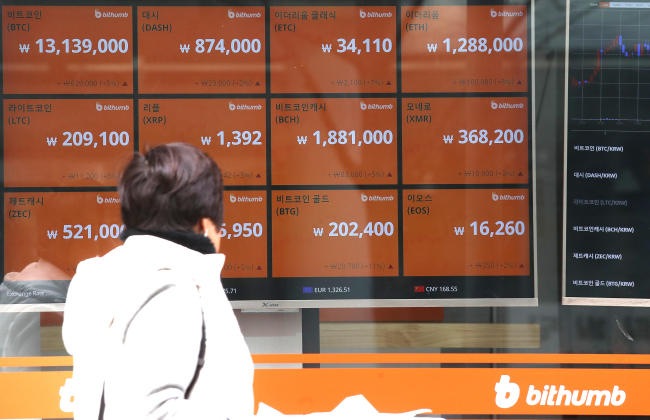[News Focus] Seoul faces dilemma on taxing cryptocurrency
By Bae Hyun-jungPublished : Jan. 28, 2018 - 18:25
While accelerating its moves to tighten control over the overheated cryptocurrency market, the South Korean government now faces another dilemma: Can the disputed virtual currency be incorporated into the nation’s tax system?
The greatest challenge is that, in order to impose tax, the government has to first recognize the disputed cryptocurrency as a legitimate financial product -- a view which a number of key policymakers have so far refused to adopt.
The pressure weighs upon Deputy Prime Minister and Finance Minister Kim Dong-yeon who is to attend a related parliamentary committee meeting this week and also to respond to a public petition demanding for cryptocurrency deregulation.
The minister will be attending the parliamentary Strategy and Finance Committee meeting on Wednesday to report on key pending issues and answer questions on real estate policies, the minimum wage, possession tax and cryptocurrency regulations.
One of the key questions unanswered so far is whether -- or how -- the government will impose tax on the highly profitable deals.
“We are considering taxation (on cryptocurrencies). It is not certain whether it will be in the form of transfer income tax, additional tax or others, so we’re making surveys on overseas cases,” Kim said during a special parliamentary committee meeting Thursday.
“The principle remains that where there is income, there shall be tax,” he also said over several occasions, leaving room for the taxation scenario.
The total volume for cryptocurrency transactions here, though the precise number is not determined, has recently been estimated at way over 15 trillion won ($14 billion). According to global cryptocurrency market researcher Coin Market Cap on Jan. 19, South Korea’s top two operators Upbit and Bithumb accounted for a combined 14.8 trillion won in daily transactions.
The greatest challenge is that, in order to impose tax, the government has to first recognize the disputed cryptocurrency as a legitimate financial product -- a view which a number of key policymakers have so far refused to adopt.
The pressure weighs upon Deputy Prime Minister and Finance Minister Kim Dong-yeon who is to attend a related parliamentary committee meeting this week and also to respond to a public petition demanding for cryptocurrency deregulation.
The minister will be attending the parliamentary Strategy and Finance Committee meeting on Wednesday to report on key pending issues and answer questions on real estate policies, the minimum wage, possession tax and cryptocurrency regulations.
One of the key questions unanswered so far is whether -- or how -- the government will impose tax on the highly profitable deals.
“We are considering taxation (on cryptocurrencies). It is not certain whether it will be in the form of transfer income tax, additional tax or others, so we’re making surveys on overseas cases,” Kim said during a special parliamentary committee meeting Thursday.
“The principle remains that where there is income, there shall be tax,” he also said over several occasions, leaving room for the taxation scenario.
The total volume for cryptocurrency transactions here, though the precise number is not determined, has recently been estimated at way over 15 trillion won ($14 billion). According to global cryptocurrency market researcher Coin Market Cap on Jan. 19, South Korea’s top two operators Upbit and Bithumb accounted for a combined 14.8 trillion won in daily transactions.

Experts, however, say that the government may be contradicting itself by imposing tax on something it is refusing to acknowledge as a legitimate financial asset.
“It is irrational for the government to move onto the taxation process, without even offering a clear definition of Bitcoin (and other cryptocurrencies),” said In Ho, a professor of computer science at Korea University.
“The priority is first to legally label cryptocurrency and then discuss relevant taxation plans within the given frame, otherwise (the government) will face resistance from taxpayers.”
Even those who consent to the cryptocurrency taxation suggested that imposing transfer income tax -- one of the possible options mentioned by the finance minister -- may not be compatible with the nation’s legal system.
“Under our incumbent tax rules, transfer income tax is operated on a positive system and may thus be imposed when specified by the law,” said Jang Jae-hyung, senior tax attorney at major local law firm Yulchon.
The United States recently started to impose tax on marginal transfer gains, while Japan applied the other incomes category such as lottery payouts.
Meanwhile, the finance minister is also to make his official response to a recent public petition posted on the presidential office Cheong Wa Dae’s webpage.
Titled “No to virtual currency regulations -- has the government ever allowed the people to dream?” the post marked over 200,000 signatures earlier this month.
The Blue House earlier promised that online petitions will be responded to by top-level government officials in charge, should they obtain 200,000 or more signees within a month.
By Bae Hyun-jung (tellme@heraldcorp.com)










![[Hello India] Hyundai Motor vows to boost 'clean mobility' in India](http://res.heraldm.com/phpwas/restmb_idxmake.php?idx=644&simg=/content/image/2024/04/25/20240425050672_0.jpg&u=)








